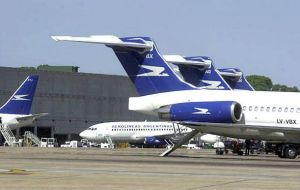MercoPress. South Atlantic News Agency
Aerolineas: Kirchners “ignore” terms of deal with Spain

Argentina's government has violated the terms of a deal to nationalize the country's largest airline, the carrier's owner said Wednesday, which could lead to a major diplomatic confrontation with Spain.
Argentina failed to seek third-party valuations of embattled airline Aerolineas Argentinas and its subsidiary Austral, as required by a takeover deal with Madrid-based Grupo Marsans, said Marsans spokesman Jorge Molina. A July nationalization agreement calls for a third party to asses the airlines' value if Argentina's government and Marsans disagreed. President Cristina Fernandez de Kirchner is stepping up nationalization efforts begun by her predecessor and husband Nestor Kirchner, and this month sent Congress a plan to take over most private pensions. But the trend could deter foreign companies from doing business in Argentina, which needs capital for its sagging energy sector and other infrastructure, Molina said. Argentine officials say the airlines are worth 832.8 million USD in debt, meaning they'd pay nothing in a takeover; while Marsans claims the airlines are worth a combined 440 million USD, according to an audit sponsored by Credit Suisse Global. A congressional committee insisted Tuesday that the company was worthless, and recommended that both airlines be expropriated. The committee's recommendation opens the way for lawmakers to present legislation calling for the company to be expropriated, said Mariano West, a congressman from the ruling Peronist party. "But we haven't been able to come to an agreement yet," he said. Marsans may appeal to the World Bank-affiliated International Centre for Settlement of Investment Disputes in Washington, D.C. if the takeover proceeds, Molina said. Argentine President Mrs. Kirchner in October promised her Spanish counterpart Jose Luis Rodriguez Zapatero to exhaust all the possible means of negotiation. The two airlines control 80% of domestic flights and employ 9,000 people. Aerolineas, Argentina's flag carrier was first privatized in 1991, but was unable to take off until Marsans moved in after other several failed attempts. However although having a virtual air trade monopoly, Marsans was unable to make the company profitable because of soaring fuel costs, Argentine government frozen administered rates and constant labour strife from union groups (with Kirchners blessings) who wanted the airline back under government control.




Top Comments
Disclaimer & comment rulesCommenting for this story is now closed.
If you have a Facebook account, become a fan and comment on our Facebook Page!